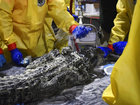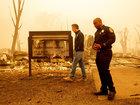New Zealand and Australia were able to send military surveillance flights to Tonga on Monday to assess the damage a huge undersea volcanic eruption left in the Pacific island nation.
A towering ash cloud since Saturday's eruption had prevented earlier flights. New Zealand hopes to send essential supplies, including much-needed drinking water, on a military transport plane Tuesday.
 Full Story
Full Story
Seven activists have gone on trial in Switzerland on Monday over charges including alleged trespassing and resisting arrest, over their roles in a campsite protest against the expansion of a limestone quarry in rolling Swiss countryside.
The defendants, who are being tried separately in rapid-succession hearings this week, are the first among some 40 people who are facing court action over the show of civil disobedience at Mormont hill, the site of a quarry owned by Swiss-French construction materials company Lafarge Holcim located about 25 kilometers (15 miles) north of Lausanne.
 Full Story
Full Story
Wildlife rehabilitators are decontaminating dozens of alligators, brushing their pointy teeth and scrubbing their scaly hides in the weeks after a pipeline rupture dumped 300,000 gallons (1.1 million liters) of diesel fuel into a New Orleans area wetland.
Diesel poured into the area outside the New Orleans suburb of Chalmette on Dec. 27 after a severely corroded pipeline broke, according to federal records.
 Full Story
Full Story
Chinese President Xi Jinping called Monday for greater world cooperation against COVID-19 and pledged to send an additional 1 billion doses of vaccine to other countries, while urging other powers to discard a "Cold-War mentality" at a time of rising geopolitical tensions — a veiled swipe at the United States.
The Chinese leader touted his country's efforts to share vaccines, fight climate change and promote development at home and abroad as he delivered the opening speech of a virtual gathering hosted by the World Economic Forum. The online event is being held in place of its annual January meeting in Davos, Switzerland, because of health concerns linked to the coronavirus pandemic.
 Full Story
Full Story
The president of South Korea on Monday vowed to world leaders that his fossil fuel-dependent country and the oil-rich United Arab Emirates would jointly expand their investments in renewable energy to tackle climate change.
During his visit to the UAE, President Moon Jae-in reiterated Seoul's commitment to reach carbon neutrality by 2050, slash methane emissions and boost renewables as the nation known as one of Asia's biggest greenhouse gas emitters comes under growing pressure to combat climate change.
 Full Story
Full Story
Environmental protesters demanding the cancelation of plans for lithium mining in western Serbia took to the streets again, blocking key roads and for the first time a border crossing.
Traffic on the Balkan nation's main north-south highway was halted for more than an hour in Belgrade, the capital, along with several other roads throughout the country, including one by Serbia's border with Bosnia.
 Full Story
Full Story
Tu BiShvat, the Jewish new year of the trees, barely registers on most Jewish calendars, except as an occasion to plant trees or eat fruit and nuts.
But the one-day holiday, which begins Sunday (Jan. 16), has gotten a boost these past few years as environmentalists have reimagined it as the Jewish Earth Day. This year, Tu Bishvat started early with the Big Bold Jewish Climate Fest, a five-day online event (Jan. 10 -14) that has drawn hundreds of Jews to reexamine ways to make climate action a central priority of the Jewish community.
 Full Story
Full Story
Their state budgets flush with cash, U.S. Democratic and Republican governors alike want to spend some of the windfall on projects aimed at slowing climate change and guarding against its consequences, from floods and wildfires to dirty air.
Democratic governors such as California's Gavin Newsom and Washington's Jay Inslee have been clear about their plans to boost spending on climate-related projects, including expanding access to electric vehicles and creating more storage for clean energies such as solar. Newsom deemed climate change one of five "existential threats" facing the nation's most populous state when he rolled out his proposed state budget this past week.
 Full Story
Full Story
The tsunami threat around the Pacific from a huge undersea volcanic eruption began to recede Sunday, while the extent of damage to Tonga remained unclear.
Satellite images showed the spectacular eruption that took place Saturday evening, with a plume of ash, steam and gas rising like a mushroom above the blue Pacific waters. A sonic boom could be heard as far away as Alaska.
 Full Story
Full Story
Earth simmered to the sixth hottest year on record in 2021, according to several newly released temperature measurements.
And scientists say the exceptionally hot year is part of a long-term warming trend that shows hints of accelerating.
 Full Story
Full Story



